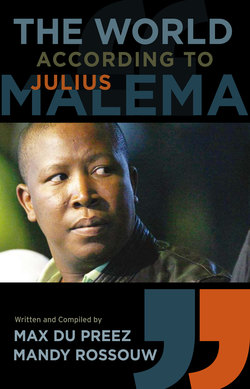Читать книгу The World According to Julius Malema - Max du Preez - Страница 3
На сайте Литреса книга снята с продажи.
ОглавлениеForeword
In April 2007 few South Africans knew of the existence of a young man called Julius Sello Malema. But by the time the country held general elections in April 2009, his name and face had become as instantly recognisable as that of the new president himself.
By mid-2009 Malema, still only 28 years old, was one of the most blogged-about people in Africa. A Google search listed more than 100 000 English pages. Hardly a day goes by without some newspaper mentioning his name somewhere. He has even featured in a fast-food chain’s advertising campaign, albeit as a puppet.
No previous president of the African National Congress Youth League, not even the controversial Peter Mokaba or the hot-headed Fikile Mbalula, Malema’s immediate predecessor, has generated such strong emotion. Few public personalities have been subjected to as many jokes and as much abuse.
But it is also true that no Youth League president before him could claim to have played such a major role in an ANC election campaign as Malema did in 2009.
It would be generally true to say that Malema is despised and ridiculed by most white South Africans as well as people from other minority groups, even by sections of the urban black elite. His behaviour has often been cited as a reason for members of the black middle class abandoning the ANC and joining the breakaway Congress of the People (Cope).
Yet it is also true that among the black youth Malema has become a much-admired hero and his arrogant, crude defiance a representation of their fears, resentments and aspirations.
Mention Malema’s name in any kind of company and you’re bound to start debates around questions such as: is he simply a buffoon, or is he actually very smart? Is he an unguided missile, or is he doing some puppet master’s bidding? Is the Zuma leadership unhappy with his statements, or does Malema’s often outrageous utterances actually suit them? And: did Malema hurt or help the ANC during their 2009 election campaign?
Another question: is Julius Malema just an interesting individual, or does he represent something bigger in South African society? If he is a symbol, of what?
There are few answers in his office, in the ANC’s headquarters at Luthuli House, Johannesburg. The large desk is shiny and empty. No papers or books or even a computer in sight, although he has said the Youth League supplied him with a laptop. A fancy living room suite with a glass coffee table adorns one corner, but there are no personal memorabilia like photographs to make the office his home away from home. From behind his desk he can look out onto the road where ministers and other dignitaries visiting Luthuli House park their cars. When his cellphone rings, the sound of a revolutionary song fills the room.
Malema’s name was catapulted into the headlines with his shocking public declaration in June 2008: “Let us make it clear now: We are prepared to die for Zuma. Not only that, we are prepared to take up arms and kill for Zuma.”
But his political career had started much earlier than that.
